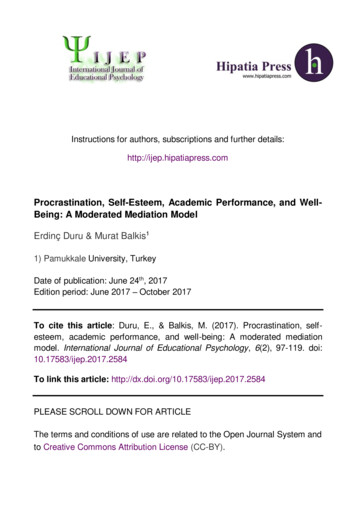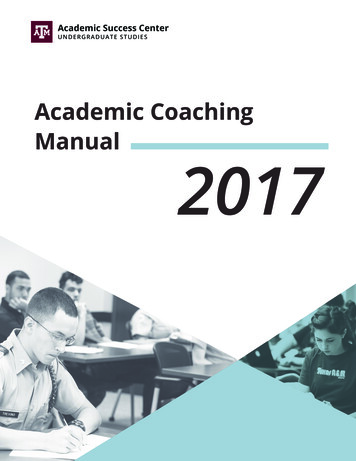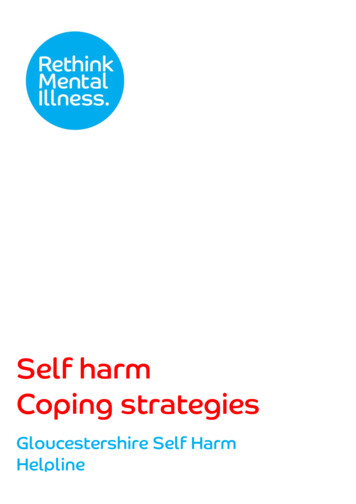
Transcription
Instructions for authors, subscriptions and further n, Self-Esteem, Academic Performance, and WellBeing: A Moderated Mediation ModelErdinç Duru & Murat Balkis11) Pamukkale University, TurkeyDate of publication: June 24th, 2017Edition period: June 2017 – October 2017To cite this article: Duru, E., & Balkis, M. (2017). Procrastination, selfesteem, academic performance, and well-being: A moderated mediationmodel. International Journal of Educational Psychology, 6(2), 97-119. doi:10.17583/ijep.2017.2584To link this article: http://dx.doi.org/10.17583/ijep.2017.2584PLEASE SCROLL DOWN FOR ARTICLEThe terms and conditions of use are related to the Open Journal System andto Creative Commons Attribution License (CC-BY).
IJEP – International Journal of Educational Psychology, Vol. 6 No. 2June 2017 pp. 97-119Procrastination, Self-esteem,Academic Performance, andWell-being: A ModeratedMediation ModelErdinç Duru, Murat BalkisPamukkale UniversityAbstractThe current study attempts to examine integrated effects of procrastination, selfesteem, and academic performance on well-being in a sample of Turkishundergraduate students (N 348). Results confirm prior evidence suggesting thatprocrastination and self-esteem were important predictors of well-being. Resultsalso indicated that both procrastination and academic performance have direct andinteractive effects on self-esteem. Self-esteem mediated the relationships betweenprocrastination and well-being. Furthermore, the indirect effect of procrastination onwell-being via mediation of self-esteem may vary depending on academicperformance. Findings were discussed in terms of related literature and furthersuggestions have been made for future studies.Keywords: procrastination, self-esteem, academic performance, well-being,moderated mediation model2017 Hipatia PressISSN: 2014-3591DOI: 10.17583/ijep.2017.2584
IJEP – International Journal of Educational Psychology, Vol. 6 No. 2June 2017 pp. 97-119Dilación, Autoestima,Rendimiento Académico yBienestar: Un ModeloMediador ModeradoErdinç Duru, Murat BalkisPamukkale UniversityResumenEl presente estudio intenta examinar los efectos integrados de la dilación, laautoestima y el rendimiento académico en el bienestar en una muestra deestudiantes turcos de pregrado (N 348). Los resultados confirman la evidenciaprevia que sugiere que la dilación y la autoestima son predictores importantes delbienestar. Los resultados también indicaron que tanto la dilación como elrendimiento académico tienen efectos directos e interactivos sobre la autoestima. Laautoestima media las relaciones entre la dilación y el bienestar. Además, el efectoindirecto de la dilación en el bienestar a través de la mediación de la autoestimapuede variar dependiendo del rendimiento académico. Los hallazgos se discuten enrelación a la literatura relacionada y se hacen sugerencias para estudios futuros.Palabras clave: procratisnación, autoestima, logro académico, bienestar, modelo demediación moderada.2017 Hipatia PressISSN: 2014-3591DOI: 10.17583/ijep.2017.2584
IJEP – International Journal of Educational Psychology, 6(2) 99Procrastination is an important subject matter and has received aconsiderable amount of interest from researchers over the pastdecades. It has been defined as self-regulatory failure (Steel, 2007),often results in undesirable outcomes including poor performanceand well-being. There is growing evidence suggesting that procrastination isa common problem among students and non-student population. Harriott andFerrari (1996) reported 20 % of adults engage in procrastination. Inacademic settings, previous studies reported 23-52% of undergraduatestudents suffer from procrastination (Balkis & Duru 2009; Özer, Demir, &Ferrari, 2009).Apart from the prevalence of procrastination, the frequency ofprocrastination experienced can influence students internally and externally.Low academic achievement can be considered as an external consequence ofprocrastination for students. Jackson, Weiss, Lundquist and Hooper (2003)stated that procrastination may disrupt academic performance in severalways (see Jackson et al., 2003 for reviews). In existing literature, threemeta-analyses were conducted to test the relationship betweenprocrastination and academic performance (Kim & Seo, 2015; Richardson,Abraham, & Bond, 2012; Steel, 2007). These studies reported thatprocrastinating students are more likely to perform poorly.As for the internal effects of procrastination on students, previousfindings indicated that procrastinating students feel anxiety (Fernie,McKenzie, Nikčević, Caselli, G., & Spada, 2016; Gagnon, Dionne, &Pychyl, 2016; Milgram & Toubiana, 1999), depression (Fernie et al., 2016;Gagnon et al., 2016; Özer, O'Callaghan, Bokszczanin, Ederer, , & Essau,2014; Steel, 2007; van Eerde, 2003), stress (Sriois & Tosti, 2012; Stead,Shanahan, & Neufeld, 2010; Tice & Baumeister, 1997), and dissatisfactionwith life (Grunschel, Schwinger, Steinmayr, & Fries, 2016; Hinsch &Sheldon, 2013; Steel, 2010). It seems reasonable to assume thatprocrastination leads to a lifestyle rife with complications that decrease theoverall quality of life and the college experience, and adversely impact thestudent’s well-being. However, many questions regarding when and howprocrastination affects well-being still remain unanswered. It is because allstudies above have focused on the direct effect of procrastination onstudents’ well-being. Thus, in order to answer when and how the
100 Duru & Balkis – Procastination and well-beingprocrastination affects well-being, it is better to examine the integratedeffects of intervening mechanisms and possible variables related toprocrastination and well-being. In this study, the integrated effects of selfesteem and academic achievement which are considered to be related withprocrastination and well-being will be tested. Previous studies reported thatprocrastination predicts self-esteem and self-esteem predicts psychologicaladjustment and well-being (Bajaj, Grupta, & Pande, 2016; Duru & Balkis,2014; Ferrari, 2000; Lin, 2015). That is to say, as the level of procrastinationincreases, self-esteem decreases and this negatively affects the well-being.Moreover, there are studies which highlighted the mediating and protectiverole of self-esteem apart from its direct effect on mental health (Pyszczynski,Greenberg, Solomon, Arndt, & Schimel, 2004; Smokowski, Guo, Rose,Evans, Cotter, & Bacallao, 2014; Sowislo & Orth, 2013). The commonfinding of these studies is that the direct, mediation, and the integrated effectof self-esteem on mental health is important. In a similar way, researchindicated that procrastination predicts academic performance and academicperformance predicts academic life satisfaction (Balkis, 2013; Kim & Seo,2015). In other words, as the procrastination increases, academicperformance worsens and this negatively affects the academic lifesatisfaction. In this sense, the effect of procrastination on students’ wellbeing is supposed to vary according to the self-esteem and academicachievement of students. Put differently, self-esteem may have a mediatorrole on the relation of procrastination and well-being and this role may varydepending on the academic achievement. Similarly, academic achievementmight have a mediator role on the relation of procrastination and well-beingand this may vary according to the level of self-esteem.Procrastination and Self-EsteemIn literature, it is highlighted that procrastination plays a protective role forself-esteem in case of a probable failure (Burka & Yuen, 2008, Covington,2007; Duru & Balkis, 2014; Ferrari, Johnson, & McCown, 1995). Accordingto Burka and Yuen (2008), procrastinators believe that their performance is areflection of their self-worth. Thus, in case of a potential failure, they thinkthat they are unsuccessful not only for doing the current task but also as an
IJEP – International Journal of Educational Psychology, 6(2) 101individual. In this case they refrain from doing that task in order to protecttheir self-worth. Similarly Thompson (1999) also indicated that individualswho are doubtful about their abilities to complete a task successfully try toprotect their self-esteem by procrastinating. Much research has pointed outthe relation of procrastination with self-esteem (Balkis & Duru, 2012;Ferrari & Diaz-Morales, 2007; Park & Sperling, 2012; Pychyl, Coplan, &Reid, 2002). Briefly, high level of procrastination is supposed to be relatedwith low level of self-esteem.Self-Esteem and Academic AchievementSuccess and failure in academic life have both major impacts on the way astudent perceives himself or herself (Suk Wai Wong & Watkins, 2001). It isexpected that students who experience repeated academic failure are likelyto develop negative feelings about themselves, on the contrary, those whoencounter success tend to develop positive views of themselves. It has oftenbeen suggested that academic achievement is closely related to self-esteem(Osborne, 1997; Pullmann & Allik, 2008; Suk Wai Wong & Watkins, 2001;Stupniskyet, Renaud, Perry, Ruthig, Haynes, & Clifton, 2007; Whitesell,Mitchell, & Spicer, 2009), nevertheless, considering the literature, thisrelationship is more complicated than it is thought to be. Some researchersasserted that self-esteem affects academic achievement (Chapman, 1988;Hansford & Hattie, 1982; Marsh, Byrne, & Shavelson, 1988), however someothers claim it is affected by academic achievement (Alves-Martinset,Peixoto, Gouveia-Pereira, Amaral, & Pedro, 2002; Baumeister, Campbell,Krueger, & Vohs, 2003; Bowles, 1999; Filozof, Albertin, Jones, Steme,Myers, & McDermott, 1998; Hoge, Smit, & Crist, 1995). It can beconcluded that while self-esteem affects academic achievement, it is affectedby academic achievement as well.Self-Esteem and Well-BeingRosenberg (1965) conceptualized self-esteem as a positive or negativeattitude towards self which is developed from the total evaluation of selfamong various affect areas. Pyszczynski et al. (2004) noted that individualswith low level of self-esteem have also low level of optimism and
102 Duru & Balkis – Procastination and well-beingmotivation, nonetheless have high level of depression, anxiety and negativefeelings. Similarly, Leary (2005) reported that in comparison with low selfesteemed individuals, people with high level of self-esteem are less likely tobe vulnerable to depression, anxiety, embarrassment, shame, guiltiness, hurt,shyness, and upset. In addition, it is found that self-esteem is associated withindexes of well-being, including low depression (Sowislo & Urth, 2013),satisfaction with life (Diener & Diener, 2009), positive affect (Wood,Heimpel, & Michela,l. 2003), hope (Symister & Friend, 2003), andoptimism (Makikangas, Kinnunen, & Feldt, 2004). Briefly, research andtheoretical framework mentioned above pointed out that the level of selfesteem has an important role on the psychological adjustment and mentalhealth of an individual. In other words, as self-esteem increases,psychological adjustment and well-being increase as well.The Current StudyA great deal of research has emphasized the negative effect ofprocrastination on well-being of students (e.g. Fernie et al., 2016; Gagnon etal., 2016; Sriois & Tosti, 2012; Steel, 2010). However, these studies are lackof a clear explanation about the nature of the process in whichprocrastination affects the well-being. In other words, the question of underwhich case and conditions does the procrastination affects students’ wellbeing more, has not been answered adequately. One way of answering thisquestion might be to examine the integrated effects of variables which arerelated to procrastination and well-being. As mentioned before, one of thevariables associated with both procrastination and well-being is self-esteem.Explanations about the relationship between procrastination and self-esteemare such that procrastination has a protective role for self-esteem in case of afailure (e.g. Ferrari et al., 1995). Apart from its protective role,procrastination is also supposed to have a negative impact on self-esteem,and academic achievement might play an important role in this process. Thisis because, as mentioned before, many researchers stated that procrastinationinterrupts students’ academic performance (e.g. Kim & Seo, 2015).Moreover, plenty of research highlighted that academic achievement ofstudents is an important resource that feeds their self-esteem (e.g. Alves-
IJEP – International Journal of Educational Psychology, 6(2) 103Martins et al., 2002; Baumeister et al., 2003). Therefore, it is supposed thathigh level of procrastination decreases the level of academic achievementand this affects student’s self-esteem negatively. Furthermore, in manystudies, it is indicated that low level of procrastination is associated withhigh level of self-esteem and academic achievement and performance (Steel,2007). Thus, the relationship between procrastination and self-esteem mightvary depending on low or high academic performance.In addition to the relations of procrastination, self-esteem and academicperformance, these relations might be associated with students’ well-being.For example, besides the adverse impact of procrastination on well-being,many studies suggested self-esteem as an important variable which effectswell-being positively (Diener & Diener, 2009; Pyszczynski et al., 2004;Wood et al., 2003). Hence, high level of procrastination might decrease selfesteem and in turn affects student’s well-being negatively. Self-esteem mighthave a mediator role in this relationship. Moreover, considering the relationof self-esteem with academic achievement and performance (e.g., Stupniskyet al., 2007; Whitesell et al., 2009), the mediator effect of self-esteem issupposed to vary according to academic performance. In this sense, thecurrent study has aimed to examine the integrated effe
high level of procrastination decreases the level of academic achievement and this affects student’s self-esteem negatively. Furthermore, in many studies, it is indicated that low level of procrastination is associated with high level of self-esteem and academic achievement and performance (Steel, 2007). Thus, the relationship between procrastination and self-esteem might










